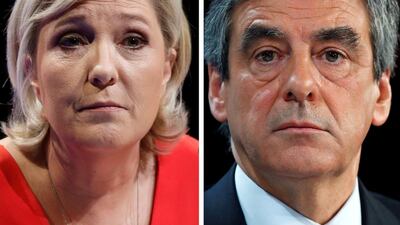Nice // A month before French voters begin to choose their next president, the election campaign has degenerated into a litany of scandals combining elements of nepotism, corruption and farce.
So much attention is focused on alleged impropriety involving two of the three main contenders — the conservative Francois Fillon and far-right candidate Marine Le Pen — that four electors in 10 are still undecided, according to one poll.
The stream of disclosures, even when accompanied by indignant denials of wrongdoing, highlights France’s unenviable history of eccentric and even unlawful practices by public figures.
One former president, Jacques Chirac, and a former prime minister, Alain Juppe, received suspended sentences over a fictitious jobs scam at Paris city hall dating from the early 1990s when Mr Chirac was the mayor.
A decade earlier, during the socialist presidency of Francois Mitterrand, a campaign of extensive phonetapping was mounted against a range of politicians, journalists and others, aimed partly at concealing the president’s tangled private life. Mr Mitterrand had created a parallel family that became public knowledge only when his illegitimate daughter reached her late teens.
And recent years have brought one scandal after another, prompting the lobby group Transparency International France to urge all candidates in the 2017 election to commit to a charter on higher standards of honesty and openness.
At the heart of current debate is Mr Fillon, candidate for the centre-right Les Republicains, who faces prosecution over payments exceeding €900,000 (Dh3.59m) — from public funds — for the allegedly fictitious or grossly exaggerated employment of his British wife Penelope, and two of their five children.
Mr Fillon served as prime minister in the government of France’s last centre-right president, Nicolas Sarkozy, also embroiled in successive legal battles and due to stand trial accused of illegally funding his 2012 presidential campaign.
Until late January, when questions first emerged about his employment of relatives, Mr Fillon seemed a shoo-in for the presidency. Outwardly a model of probity, he was the clear favourite to keep the Front National’s Ms Le Pen out of the Elysee palace.
But the allegations led to him being “mis en examen” — close under French law to being formally charged — and his wife is expected to suffer the same fate on Tuesday, unless the date is changed.
Mr Fillon was especially wounded by suspicions of hypocrisy after presenting himself as above reproach. Hundreds of natural allies deserted his camp and he slipped to a poor third in the opinion polls, behind Ms Le Pen and the young, centrist pretender Emmanuel Macron.
In the past two weeks, Mr and Mrs Fillon’s troubles have deepened.
First there was the revelation that he had accepted two suits worth €13,000 from a wealthy friend. If this was more an embarrassment than evidence of criminality, worse was to come.
French media quoted judicial sources as saying the investigation of the Fillons had been widened to establish whether documentation supporting the legitimacy of payments to Mrs Fillon had been forged.
The couple and their lawyers have repeatedly protested their innocence and complained that information about judicial procedures against them had been leaked. Mr Fillon even accuses Mr Hollande of creating a dirty tricks department.
But many in France believe he should have stood down weeks ago.
It was Mr Fillon who only last year drew attention to Mr Sarkozy, one of his rivals in the Republicains’ party primaries. Who, he asked, could imagine the late French statesman, General Charles de Gaulle, accused of criminal offences?
At first sight, Ms Le Pen occupies only marginally higher moral ground. She, too, faces investigations over fictitious employment — party officials given bogus jobs linked to her membership of the European parliament — and the alleged under-declaration of personal assets. Separate inquiries concern the funding of past election campaigns and the bizarre use of violent ISIL images to counter a broadcaster’s claim that the Front National was comparable to the terrorist group.
Like Mr Fillon, Ms Le Pen cries victimisation.
Among many supporters, this carries weight because they have grown immune to persistent attacks on her anti-Islam, anti-immigration, anti-European Union party.
Mr Macron, 39, has endured impertinent comments about his marriage to a woman old enough to be his mother, his former French teacher Brigitte, 63. But his campaign is so far free of scandal despite attempts by the socialist candidate Benoit Hamon, to query the sources of his campaign funding.
Mr Hamon is also above suspicion.
But as if to show that the left is also prone to questionable conduct, the socialist interior minister, Bruno Le Roux, was forced to resign last week after it emerged that he had employed two daughters, then at school or college, as assistants, their “pocket money” totalling €55,000.
On current projections, Mr Macron would win the May 7 run-off election after a close battle with Ms Le Pen in the first round on April 23.
Last week, Transparency International France published results of attempts to persuade candidates to sign up to its charter.
Among the front-runners, Ms Le Pen had wavered the most on the charter’s 11 clauses. But Mr Fillon had not responded at all, although he did tell a televised debate between candidates that he favoured a government commission on transparency.
“Corruption in France is not endemic,” said Daniel Lebegue, president of Transparency International France. “But many fellow citizens feel we are sinking into a swamp where everyone is rotten.”
foreign.desk@thenational.ae


